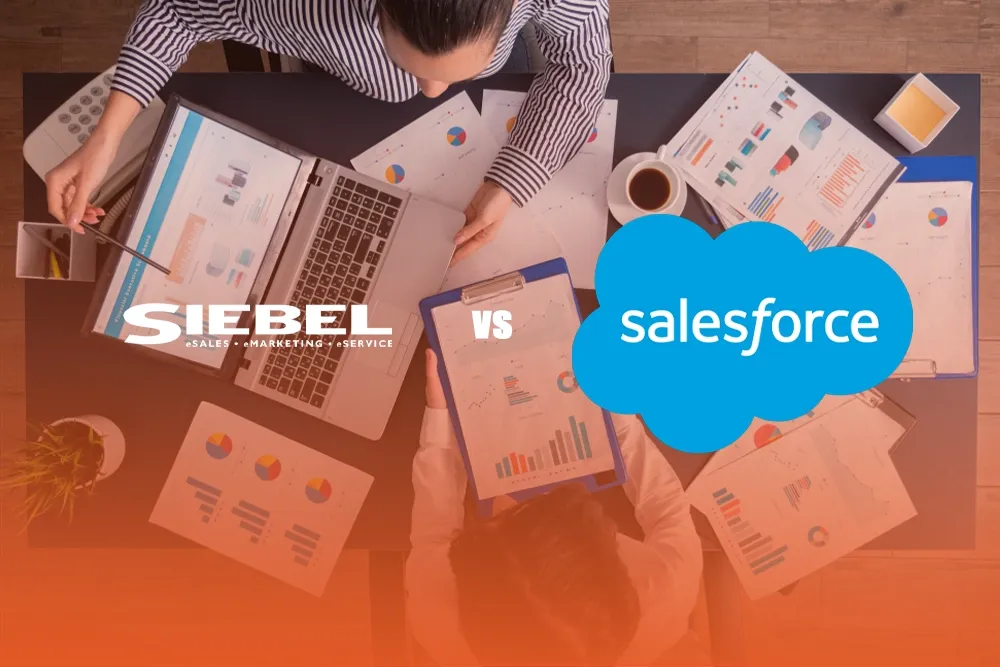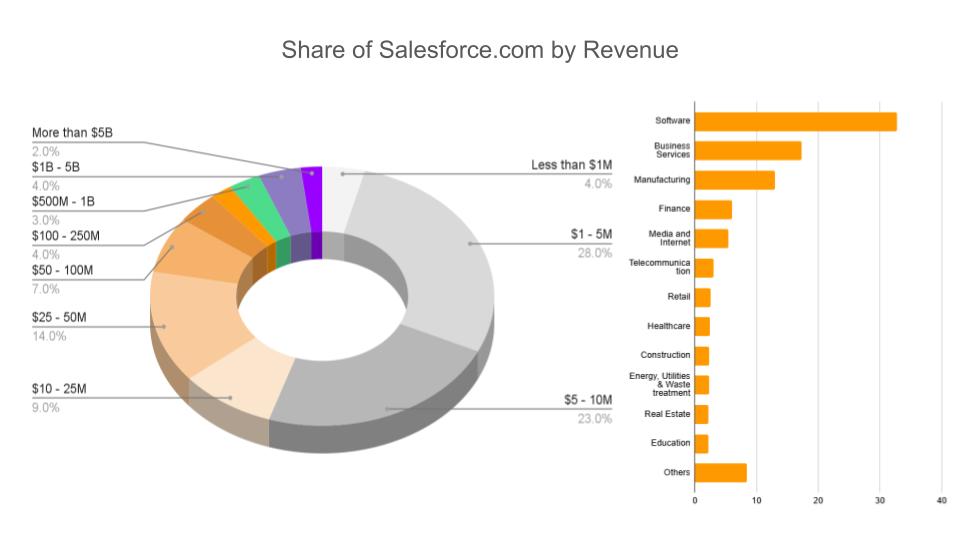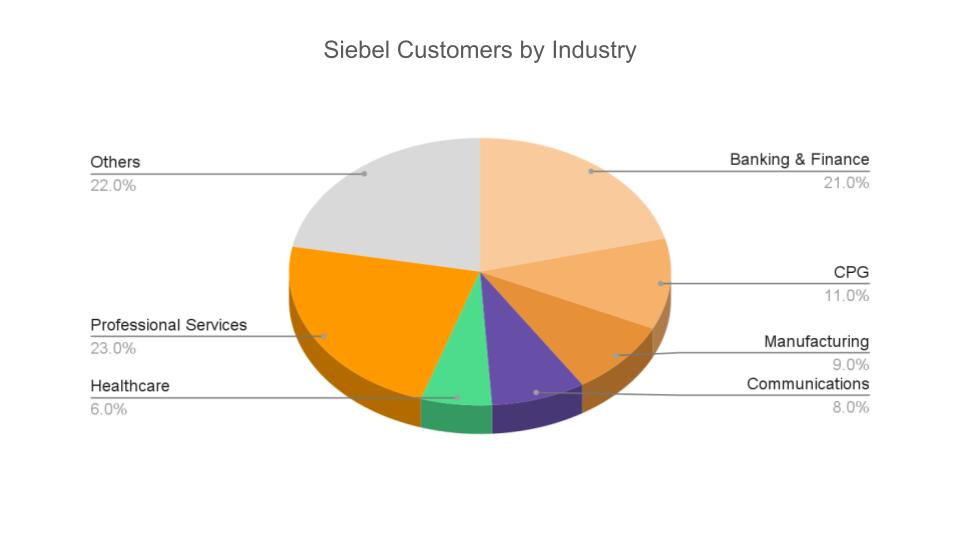
When we talk about CRM (customer relationship management) software the first names that pop up in mind are Salesforce and Siebel. The Siebel CRM vs Salesforce debate has been going on for years. Surely, both tools help you store and organize information to streamline fundamental business processes. However, they come with their own pros and cons which can make it hard for you to pick the right one.
Therefore, to save you the trouble we have done the research for you. In this Siebel CRM vs Salesforce guide we will tell you everything you need to know about the two platforms. We have covered it all, from their similarities and differences to the pricing.
So, let’s dig right in!
Salesforce is a cloud based CRM for businesses to track and manage their sales. It is owned by Salesforce.com which is a San Francisco based SaaS and cloud computing company. Basically, Salesforce was founded in March 1999 by Marc Benioff, a former executive at Oracle.
Particularly the main feature of Salesforce is that it allows employees across various departments to collaborate and track workflows. Also, you can build new applications and totally customize the platform to your specific needs.

Siebel CRM Systems was a software company founded in 1993 by Thomas Siebel and Patricia House. In fact, it is one of the first CRM applications to offer such a wide range of features and tools. Well, Siebel is now owned by the Oracle Corporation and offers many resources for all types of industries.
In addition to being a CRM tool, Siebel also offers many other applications. For example, partner relationship management (PRM) and enterprise resource management (ERM). It is mostly popular among businesses that have a huge customer base.

Given that Salesforce and Siebel are both CRM platforms, there are bound to be some similarities. These include:
Both platforms offer extensive tools for sales, marketing, and customer service. They provide features like sales forecasting, opportunity management and customer service portals.
Siebel can be customized to meet specific business requirements. Similarly, Salesforce has many customization features as well. For instance, your team can create personalized workflows, user interfaces and data models. Hence, both of them can adapt to the unique operational needs.
You get support integration with various third-party applications and services in Salesforce and Oracle Siebel. These integration services provide smooth data flow across different systems. Hence, businesses can maintain cohesive and organized operations. Notably, there will no longer be communication barriers or data silos.
Salesforce and Siebel can scale to support a high number of users and data volumes. Therefore, both tools are designed to accommodate business growth. This makes them suitable for all businesses whether it’s a small enterprise or a large corporation.
Salesforce and Siebel have mobile applications as well. This enables sales and service teams to access the CRM data right on their smartphones even on the go. Thus, employees can manage customer relationships easily from any location.
Data protection is very important which is why both Salesforce and Siebel have strong security features. For example, you get role-based access control and encryption protocols for data integrity. Additionally, they comply with all industry standards and regulations.
Finally, both these CRMs have extensive support networks and active users. You can access documentation, training materials and forums to get help. Overall, you become part of a global CRM community with a collaborative environment.
Now, let’s discuss the main differences between Oracle Siebel CRM vs Salesforce. Here's a detailed comparison between Siebel and Salesforce:
We have talked about the commonalities and differences between Salesforce and Siebel CRM. But we have to look at the individual strengths and weaknesses of each platform as well. To provide clarity, here are the pros and cons of Oracle Siebel CRM vs Salesforce Sales Cloud:
PeerSpot created a detailed Siebel CRM vs Salesforce report based on actual user experience and feedback. On the whole, here’s how both the applications scored on various scales. This will help you get a better understanding of which of the two CRMs is performing better among actual real users.
Note: View the full report here.
Based on our analysis, Salesforce has an edge over Siebel or any other CRM. In essence, here are the main reasons why:
First, Salesforce is easy to change and adapt. It works well with other apps, so businesses can make it fit their needs. Conversely, Siebel is harder to change and set up which can be a problem for some users.
Salesforce is also always improving as it was one of the first to offer cloud-based CRM. It keeps adding new features like artificial intelligence, cloud computing and mobile tech. Sadly, Siebel doesn’t update as often and still lacks many modern CRM features.
Salesforce delivers what it says and that’s why it’s gaining more customers over time. It’s a CRM that will streamline your business processes and sales funnel. Furthermore, even customer reviews and feedback show that Salesforce improves tasks and speeds up decisions.
After looking at the different aspects we have concluded that Salesforce is better than Siebel. As a result, it is a clear winner. We compared them on different aspects like overall user satisfaction, pricing, features and flexibility.
To summarize, here’s is a quick highlight of why Salesforce has the upper hand:
However, this doesn’t mean that Siebel isn’t worth the investment. After all, Siebel remains a leading CRM solution for mid-sized and large enterprises. Altogether, its capabilities and data management make it a great choice for established organizations.
In the Siebel CRM vs Salesforce battle, we have concluded that both are great tools for companies to manage their customer relations. They are both cloud-based with a wide range of comprehensive tools and features. But while both are good, Salesforce is usually seen as better than Siebel.
All in all, the decision to choose between two depends on your specific business needs and goals. Oracle Siebel is the right pick if you have lots of custom needs and can handle a more complicated setup. In contrast, Salesforce is ideal if you want a flexible and updated system that’s easy to use.
If you’re drawn to Salesforce then reach out to us. PixelConsulting is a well known CRM consultant covering all things Salesforce. We offer a range of services like Salesforce adoption, implementation and customization. Contact us today!
Read Also: Easy Guide To Adopting Salesforce
Yes, you can migrate from Siebel to Salesforce. There are many tools that allow you to to transfer critical data from one CRM to another without manual intervention.
Yes, Salesforce is the #1 ranked CRM platform in the world for the 11th consecutive time. It got the top position in Worldwide Semiannual Software Tracker by IDC 2023 Revenue Market Share Worldwide.